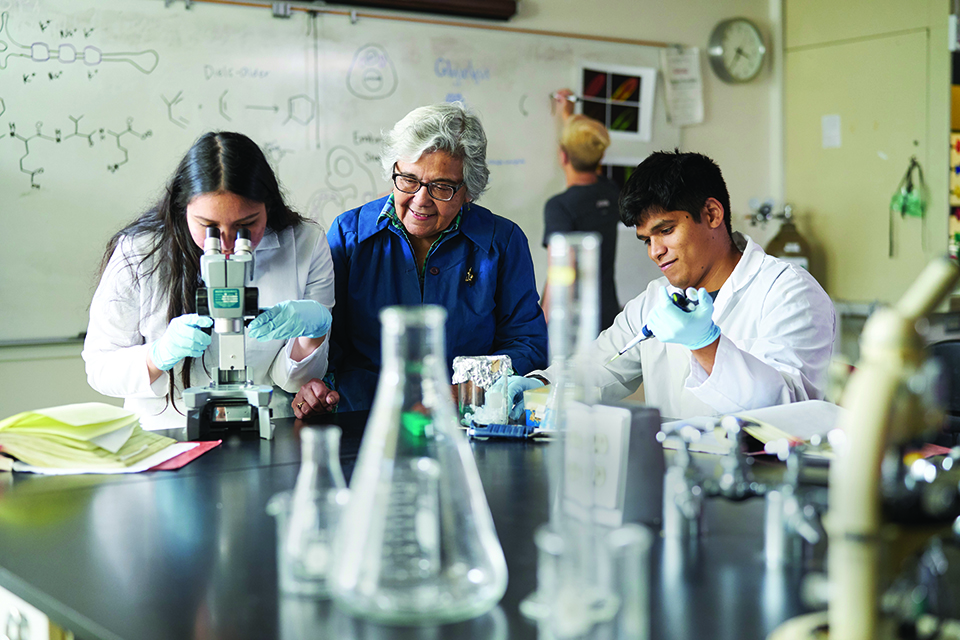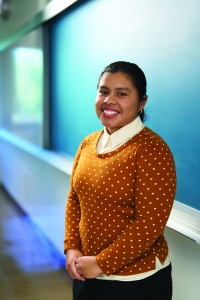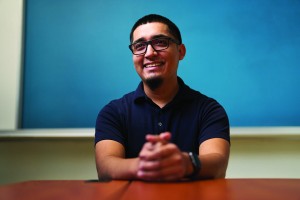CSUN’s AIMS2, BUILD PODER and U-RISE Help Open Doors for Underrepresented Students.
By Danielle Fairlee – Photos by Steve Babuljak

Biology professor MariaElena Zavala (center), lead director of CSUN’s U-RISE program, is passionate about providing undergraduates with opportunities to conduct scientific research
Three flagship programs at California State University, Northridge are among the robust resources at the university that are opening doors to research, graduate education and careers in science, technology, engineering and mathematics (STEM) for underrepresented student populations. By offering stipends, academic support, research opportunities, mentorship and professional development, these programs not only help students succeed, but they also help diversify the workforce of the future, faculty members say.
According to a 2021 report by the Pew Research Center, Hispanic and Black workers continue to be underrepresented in the STEM workforce, and “the long-term outlook for diversity in the STEM workforce is closely tied to representation in the STEM educational system, particularly across the nation’s colleges and universities.” Another report, from a recent White House roundtable on advancing equity in STEM, called for “a STEM ecosystem that reflects the full diversity of the American people, thus spurring innovation, and increasing economic benefit for historically underrepresented groups and the entire country.”
With these goals in mind, three programs at CSUN—AIMS2, BUILD PODER and U-RISE—provide students with academic and professional opportunities along with mentoring and support, leading to what their professors have called “transformational change.”
Belonging and a Sense of Empowerment
AIMS2 is an award-winning program that partners with several community colleges to close achievement gaps, improve transfer success and increase overall graduation rates for Latinx and low-income transfer students in the College of Engineering and Computer Science. In 2021, AIMS2, which stands for Attract, Inspire, Mentor, and Support Students, won a National Award of Excellence from the University Economic Development Association. In 2019, AIMS2 was named an Example of Excelencia by Excelencia in Education.
Since 2011, AIMS2 has served approximately 3,000 community college students and nearly 600 students at CSUN. Initially funded by a five-year, $5.5 million grant from the U.S. Department of Education’s Hispanic Serving Institutions STEM program, AIMS2 received a sequel five-year grant in 2016.
CSUN civil engineering major Jennifer De Avila started in AIMS2 at College of the Canyons in Santa Clarita. The 30-year-old mother of a young daughter said the program provided the financial support and academic community she craved. One of the most helpful aspects of AIMS2, De Avila said, was attending a bridge program the summer before she started at CSUN, when she worked as a research assistant. She said the experience gave her time to make friends, meet professors and learn her way around. “By the time fall semester started, I knew the campus,” she said. “I had an established community and I felt like I belonged.”
De Avila, who completed her studies and officially graduated in December, already has a job secured as a civil analyst with the international civil engineering firm Kimley-Horn, working in the company’s downtown Los Angeles offices. She credited AIMS2 and her time at CSUN for her success.

Senior civil engineering major Kathleen Molina, a first-generation college student, says her AIMS2 cohort helped provide her with a sense of belonging — in the engineering department and at CSUN in general.
“It is a relief,” said De Avila, who noted that her college journey meant time away from her daughter, Elizabeth, 6. “I know that time I spent away from her will benefit her. I’m building her generational wealth. She will have more opportunities because of this, and that is what you want to give your kids—a better future, a better tomorrow.”
Senior civil engineering major Kathleen Molina said the AIMS2 cohort model was vital to her CSUN experience.
“As a first-generation college student, it was all new to me,” Molina said. “In the beginning, I felt kind of alone. In my family, no one went to college, so they couldn’t really help me.”
Being part of AIMS2 her first year helped provide a sense of belonging, not only in the engineering department, but at CSUN, Molina said. “Having support and a faculty mentor I met with every month was so helpful and made me feel like I wasn’t alone,” she said.
In addition to working as an undergraduate research assistant, Molina is a peer mentor for AIMS2, helping students get the resources they need to succeed. “I do my best to give them advice to stay motivated,” she said. With graduation just a few months away in May 2022, Molina said she is researching internship opportunities and applying to graduate programs to study structural engineering.
AIMS2 focuses on students from underrepresented groups, often the first in their families to go to college, said professor S.K. Ramesh, founding program director. Scholars in the program work collaboratively in cohorts and meet regularly with faculty. They receive modest stipends, along with peer mentoring and career preparation, including research opportunities.
“The cohort gives our students a sense of belonging and a sense of empowerment,” Ramesh said. “They are just as good, if not better, when compared to all students. They just need someone telling them they can do it and helping them see their potential. Students graduate from the program with enormous self-confidence and serve as role models for those who follow in their footsteps.”
With present funding for AIMS2 set to run out in June 2022, Ramesh said he is “cautiously optimistic” new funding will be secured to continue the life-changing program.
“I’ve seen it with my own eyes,” he said. “Not only are the individual students transformed, but our whole community is transformed.”
Recent graduate Christian Mariscal ’21 (Mechanical Engineering) took part in AIMS2, working in the lab of manufacturing systems engineering and management professor Bingbing Li. Mariscal said the experiences he gained in Li’s lab helped him land a job as a manufacturing engineer intern at Crane Aerospace & Electronics in Burbank.

Recent graduate Christian Mariscal ’21 says the experiences he gained in the AIMS2 program helped him land a job as a manufacturing engineer intern.
“AIMS2 helped me develop my professional skills to the point I felt confident in interviews and speaking in public,” Mariscal said.
Raised in South Los Angeles, Mariscal is the first in his family to earn a bachelor’s degree. “My family is very happy for me,” he said. “Going to CSUN was a pivotal decision, and taking part in AIMS2 definitely bolstered my academic experience.”
The success of students like De Avila, Molina and Mariscal is inspiring, Ramesh said. “People look at programs like AIMS2 and say, ‘Wow, this is difficult work,’” he said. “True. You need resources and people. But when we come together and understand that to achieve equity and inclusive excellence, we need to do everything we can to empower our students—it is our obligation. Our society and our country benefit.”
Diversifying Biomedical Research
BUILD PODER is another CSUN program aimed at increasing diversity in STEM, specifically in the field of biomedical research. It received the 2020 Inspiring Programs in STEM Award from INSIGHT Into Diversity magazine for encouraging and assisting students from underrepresented groups.
Open to all STEM and health-related majors, BUILD PODER initially was funded in 2014 by a five-year, $22 million grant from the National Institutes of Health (NIH), one of the largest grants in CSUN history. In 2019, the NIH awarded a five-year, $19 million grant to continue the program, with the aim of replicating it at institutions of higher learning across the country.
BUILD PODER (Building Infrastructure Leading to Diversity, Promoting Opportunities for Diversity in Education and Research) takes a three-pronged approach to education to increase diversity in the biomedical workforce, said CSUN psychology professor Gabriela Chavira, principal investigator for the program. “This is really three grants in one,” Chavira said. In addition to helping increase the number of students who pursue biomedical careers, the program includes increased faculty mentoring and research opportunities and university transformation by increasing research capacity and institutionalization of BUILD-developed initiatives.
“These three things come together to create institutional changes,” Chavira said. “Long past the grant, we hope what we learn from the students and the faculty will remain in the institution.”
BUILD PODER students receive stipends, mentoring and support, including help in applying for graduate-level programs. Senior psychology major Dianna Alvarado is in her second year in BUILD PODER. The program has provided the strong support network she needed as a transfer student, Alvarado said. The South Los Angeles resident is currently applying for Ph.D. programs in social psychology. Her goal is to study the academic needs of STEM students, she said.
“I want to study how academic identity, ethnic identity—especially for Latinx and Black students —affect academic achievement in higher education,” Alvarado said. “I want to look at support systems and how we can support underrepresented students better.”
Now in its eighth year, BUILD PODER has served more than 300 students at CSUN and at local community colleges. “We still have a few years to see the full effects,” Chavira said, “although we are already seeing positive results.”
One BUILD PODER success story is Paulo MacMillen Sitagata ’18 (Kinesiology). A member of the program’s first cohort, he earned his Doctor of Physical Therapy (DPT) from Northwestern University in April 2021 and is the first BUILD PODER graduate to receive a doctorate.
In addition to his own determination and hard work, BUILD PODER played an important part in his acceptance to Northwestern, Sitagata said. The summer before his senior year at CSUN, he took part in a required summer research program.
“I ended up at Northwestern, working with brilliant people and doing research in downtown Chicago,” he said. By the time he returned to CSUN, Sitagata said, he knew he wanted to attend Northwestern’s graduate physical therapy program.
Now, with DPT in hand, Sitagata recently passed his board exams. Looking back, he said, his academic success began with his acceptance into the BUILD PODER program.
“Financially speaking, I came from a humble background,” he said, noting that when he transferred to CSUN from Los Angeles Valley College, he and his mother had been living in a motel. “I have to say that being accepted into the program was definitely life-changing. It gave me information, direction, financial assistance and the freedom to focus on school, to get involved in research, to learn about research and higher learning. It was a huge blessing.”
Of CSUN’s BUILD PODER graduates to this point, 60 percent are already in graduate school, Chavira said. With grant funding coming to an end, BUILD PODER’s leaders are focusing on institutionalizing the program. Chavira said she is working with the California State University Chancellor’s Office to develop an online training program based on BUILD. “We need to share our successes and put them in place for all CSU campuses,” she added.
Fostering Opportunities for Undergraduate Research
New to CSUN in 2021 is U-RISE, the Undergraduate Research Training Initiative for Student Enhancement, for students studying biomedical sciences with an eye toward earning a Ph.D. Funded by a nearly $3 million grant from the NIH, U-RISE is designed to equip undergraduate students with skills that make them more competitive for entry into graduate schools.
Targeting students from traditionally underrepresented communities, the program provides tuition assistance as well as stipends and support for attending scientific conferences or for conducting research.
U-RISE replaced CSUN’s Maximizing Access to Research Careers (MARC) program for undergraduates, which was on campus for 31 years, as well as the Research Initiative for Scientific Enhancement (RISE) program for undergraduates and post-graduates, which was at CSUN for 28 years. Since 2000, MARC and RISE supported more than 400 graduate and undergraduate students, successfully helping to increase the number and capabilities of underrepresented scientists engaged in basic biomedical research, said biology professor MariaElena Zavala, longtime director of the previous programs and now lead director of U-RISE. Thousands more Matador students took part in MARC and RISE program activities, including summer workshops and guest speakers.
The first cohort of seven U-RISE students have settled in at CSUN and started their required lab rotations, Zavala said. Recently, the students attended either the National Diversity in STEM Conference sponsored by the Society for the Advancement of Chicanos/Hispanics and Native Americans in Science, or the Annual Biomedical Research Conference for Minority Students.
“They listen to research talks and see other students’ work, but also get to visit with and hear from people doing science we don’t necessarily do here at Northridge,” Zavala said. “It broadens their horizons about research at other places.”
Zavala said U-RISE helps students in a variety of ways, including academic and financial support, but the opportunity to work as a research assistant in a campus lab is critical to their success. “You just can’t give people money and expect them to be scientists,” she said. “You have to provide them with the opportunity to actually conduct research and develop in a culture where their scientific prowess is valued.”
It is exactly that culture that Zavala works to foster with her U-RISE students.
“These students come to us as diamonds in the rough. They are all brilliant inside, and we polish them up,” she said. “I tell them they can compete with any student out there, as long as they know their stuff.”
Programs like U-RISE, AIMS2 and BUILD PODER are part of an increasing movement to advance diversity in STEM, Chavira said.
“There is a lot happening,” she said. “We are seeing increased programming focused on diversifying the sciences. We are seeing more of this not just at CSUN, but across our nation, to understand diversity and opportunity gaps. It is really a beautiful time to be a part of this. There is this push, this momentum, toward valuing research. Our university is going to produce amazing scientists, with all the energy that is going into these initiatives.”
Success of HSI Pathways Lives On at CSUN
Following the unprecedented success of a recent program designed to build career pathways for minority students to become professors in the humanities or related fields, CSUN faculty researchers are examining student data to learn what can be replicated on campus to help more students prepare for graduate school.
The recently concluded HSI Pathways to the Professoriate program provided financial assistance and academic support to undergraduate students, to prepare them for Ph.D. programs—with the goal of increasing the number of Latinx professors. Three cohorts of CSUN students took part, culminating with the class of 2020.
“Every student who applied to Ph.D. programs was admitted with full funding—including tuition and a living stipend—to attend graduate school,” said Heidi Schumacher, HSI Pathways coordinator. That adds up to 27 CSUN alumni of HSI Pathways in doctoral programs across the country, she said.
Following that 100 percent success rate, Schumacher is researching how CSUN can replicate the success of the program to help more students prepare for graduate school. Already, CSUN is using some of the data from HSI Pathways to pilot a faculty mentoring program. Findings from HSI Pathways are also informing the development of a soon-to-launch campus resource center for students who want to go to graduate school.
“HSI Pathways was a great experience and extremely successful,” Schumacher said. “But the true test of its lasting effects is creating a ripple effect for students. We have to take the lessons we learned and apply them on campus, creating lasting change and making sure this pipeline is there for every student.”
CSUN was one of three Hispanic Serving Institutions (HSIs) to partner with the Rutgers Center for Minority Serving Institutions in hosting the HSI Pathways to the Professoriate program. It was supported by a $5.1 million grant from Andrew W. Mellon Foundation.
—Danielle Fairlee
